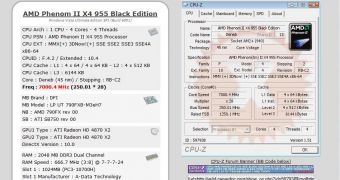Sunnyvale-based Advanced Micro Devices wants to show the world that its processors are capable of breaking the world records when it comes to their overclocking capabilities. As such, the company sponsored an overclocking event in Finland, where its AMD Phenom II 955 Black Edition processor was pushed up to the impressive speed of 7.0GHz, a figure that might become a new world record in case the results are validated.
Previously, this processor was brought to speeds of 6.5GHh, 6.7GHz and 6.88GHz, and this time it managed to best its own performance. The most attractive part in this equation is the fact that we are talking a processor that is available for purchase at any retail store, the AMD Phenom II 955 Black Edition, though we should mention that the chip was cooled down using liquid helium, something that you won't find for purchase that easily.
Even so, the speeds are not coming from the Phenom II 42 TWKR Black Edition chip, which is not available for purchase yet, though it should be more overclockable than the quad-core 955 BE. The Deneb 45nm silicon managed to reach 7000.4MHz with all four cores, with 4x64KB L1 data, 4x64KB L1 instruction, 4x512KB L2 cache and 6MB L3 cache.
The team that achieved this goal used a 28 multiplier with a 250.1MHz bus clock on a 1.25GHz bus. The motherboard that was used for the testing was a DFI “LANParty” UT 790FXB-M3eH7 that sported a digital PWM. An AMD 790FX rev 00 NB and ATI SB750 rev 00 SB were present on the board, and the team also placed on it dual ATI Radeon HD 4870 X2 graphics boards, along with 2GB DDR3 dual-channel 667MHz RAM at 7-7-7-24.
For the time being, it seems that the results haven't been validated yet, as the CPU-Z validation result files “have that red mark in there.” Since the results were submitted on Saturday, July 4, 2009 at 6:30pm, the team stated they planned on contacting the authors to see what issues had surfaced. Hopefully, the record will get validated in the end. More info on the overclocking attempts can be found here.

 14 DAY TRIAL //
14 DAY TRIAL //